#Intrinsic Value Films
Text
The Devil Is Never Pretentious with His EVIL! "Satan's Little Helper" reviewed! (Synapse Films / Blu-ray)
The Devil Is Never Pretentious with His EVIL! “Satan’s Little Helper” reviewed! (Synapse Films / Blu-ray)
Bluray is Currently Cheaper than DVD! Grab “Satan’s Little Helper” Fast!
Obsessed with his new video game Satan’s Little Helper, where a little boy helps the Satan dispense murderous bloody mayhem, naïve Dougie, sporting his own hot red Satan costume and mask, swears he’ll have a chance to meet Satan himself during Halloween. Who Dougie believes he stumbles upon is the master of darkness but,…
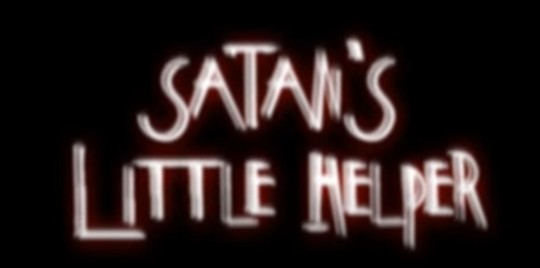
View On WordPress
#2004#Alexander Brickel#Amanda Plummer#Anthony Pepe#blu-ray#Blue Sunshine#Dan Zisiki#Dark Comedy#Dejan Georgevich#horror#horror comedy#Intrinsic Value Films#Jeff Lieberman#Joshua Annex#Just Before Dawn#Katheryn Winnick#Long Island#Melisa McGregor#MVDVisual#Polar#Pulp Fiction#Satan&039;s Little Company#Satans Little Helper#Screen Media Films#Squirm#Stephen Gramham#Synapse#Synapse Films#The Last Thing Mary Saw#The Prophecy
0 notes
Text
okay... so I get why I was hesitating to watch soulmate (2023)
#beautiful film#like the cinematography and scenery was so incredibly lush with comfort and nostalgia#so many rich colours so many interesting shots and angles so many different + distinct sets/places#and yeah it just. yeah. it really was heartbreaking#I already knew the big twist so it didn't shock me but the film did leave me with a bit of a sad ache#just seeing the ebbs and flows of their friendship and the longing they both have for each other. the intrinsic and eternal string that#link them together forever more. was just so beautiful#as someone who values their friendships a lot it was so beautiful to see a film centering on the eternal nature of true friendship#and how true deep friendship can almost be soul binding in which you guys never truly leave each other no matter the pain or distance#how those old friendships stay with you forever and how those friends you'd always return to because a piece of you still resides in their#palms#the film did a wonderful job between flashbacks too and leaving things ambiguous at times#spoilers ahead!!!#but what was most saddening to me was the years and happiness lost due to their miscommunication and intense love for each other that#actually ended up making them not address their problems with each other and therefore have their friendship fall apart#like. if they had just communicated about the guy and didn't distance themselves from each other#and if miso hadn't left the hotel after the Busan trip and they had just had a conversation about the fight#like. so much of the conflict and resentment and pain and distance wouldn't have happened#they could have travelled together painted together spent their years together#if just the most minute things had been different if they had just used their love as reason to address their problems rather than run away#they could've had so much they could've had so many years together if they had just spoken to each other#and that is the most heartbreaking of all. that they could've had a life together if things had been different#and just seeing the transition from their innocent and freeing childhood + teenagehood into the conflicts hardships and growth of adulthood#is painful too#just that loss of youthful freedom love friendship dreams and entering into the harsh and difficult reality#when things are no longer always about sitting under the sun with your friend and watching the sea#yeah that was hard#salmaspeaks#films#soulmate (2023)
3 notes
·
View notes
Text
venus is detriment in scorpio bc... what??
it's funny because these days i feel like with the rise of "booktok" (im so sorry) and also popular films like saltburn, romance/love is being portrayed as having to be obsessive and intense (which are naturally scorpionic traits) to be considered "true" love, and i have definitely fallen for that notion. it has always been confusing to me how venus, the planet of love, could be detriment in the sign of scorpio, one that is characterized by its loyalty and depth of intimacy--is that not love? and after some life experience (aka being close friends with a LOT of people with prominent scorpio placements/dating those people), i finally understand.
while scorpio's intensity certainly encourages depth and intimacy in relationships, this same intensity also lends itself to black and white thinking, and if you know anything about relationships, especially ones that are built to last; there takes a certain degree of understanding and chill-ness (for lack of better word). loving someone and being in any sort of intimate connection with them also requires trust; sometimes people need space to figure out things for themselves, and then the ride-or-die traits of scorpio become overbearing. scorpio is also a fixed sign and thus stubborn, but relationships that stand the test of the time must be built on compromise and understanding, especially in the face of conflict.
love is also no fun when one person has all the power. you can shower another person with all the gifts, affirmative words, and favors in the whole wide world, in hopes that they will be dependent on you, in hopes that they will be more willing to do the things that you want them to do, but human beings intrinsically value their autonomy and individuality (over almost all things) and slowly become resentful--even unconsciously--of this behavior because covert control is still control.
that being said, scorpionic love forces you to take an honest look at yourself and your relationship with power. being in these dynamics has allowed me to see where i give away my power to other people, where i try to have power over others, and the almost unconscious mechanisms behind both. i have never left one of these dynamics untouched... for better or for worse.
if you're lucky, both people in the dynamic can look an honest look at their part in the whole thing, and things--the relationship, you, the other person--can be transformed for the better.
#venus#scorpio#scorpio venus#astrology#astro observations#mine#im a scorpio rising#scorpio rising#scorpio moon#scorpio mars
22 notes
·
View notes
Note
In regards of httyd, I get it/you. I'm not a toothcup shipper but I understand why someone might be. I loved their dynamics too but in a more pet/friend way.
I actually liked Toothless more in the first movie where he was more animalistic, more wild. I get why the shift happened and all, hence his different, friendlier design in the second and third films. But I think animals that behave like humans while keeping a lot of their wild characteristics are rare, usually it's like, weirdly humanized dragons and all.
Interestingly enough, they actually tweaked the script of HTTYD 1 specifically because they didn't want Toothless to come across as just a pet! And it's true, he's not. He's not human, but he's a sapient being that understands human speech, apologies, and the intrinsic value of art. He and Hiccup are equal partners in everything they do, platonic or otherwise.
Here's a really good reply someone gave me back in the day about HTTYD 2 Toothless, and how what he lost in terms of some of that wild, mysterious aura and design in the first movie, he made up for in personality. Also, why the third one shot that to oblivion.
20 notes
·
View notes
Text
As a "film buff," one thing I will never get over is how long color and black and white film coexisted. Color films started popping up in the 20s, and gained real popularity in the 50s, but black and white films were still commonplace through the 60s.
For example, the black and white Vincent Price classic The Last Man on Earth, and the technicolor splatter flick 2000 Maniacs both came out in 1964.

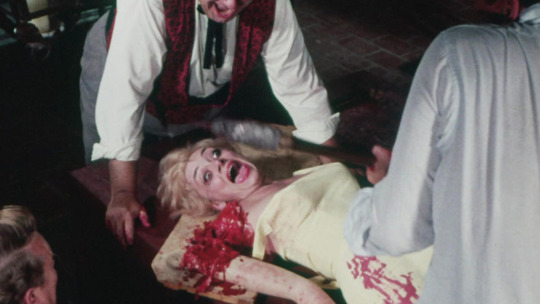
Incidentally, 11 years after Vincent Price starred in the full-color—and 3D—House of Wax (1953).
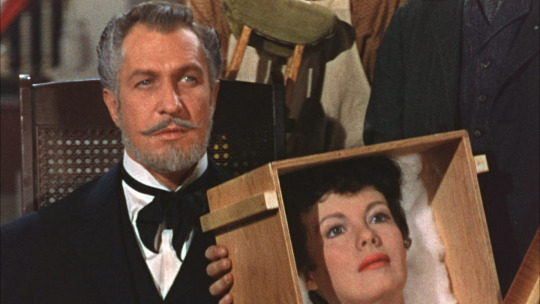
which just happened to come out 4 years before Ed Wood's Plan 9 From Outer Space (1957).
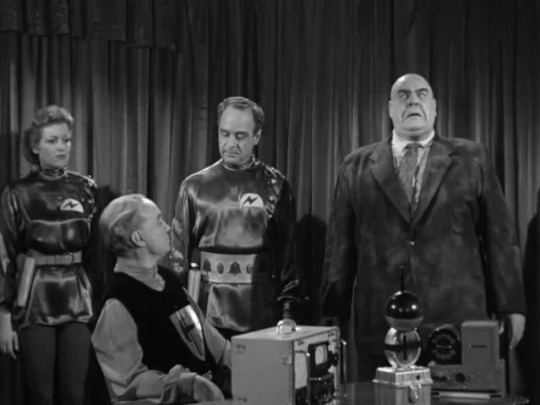
The same year as The Curse of Frankenstein (1957)
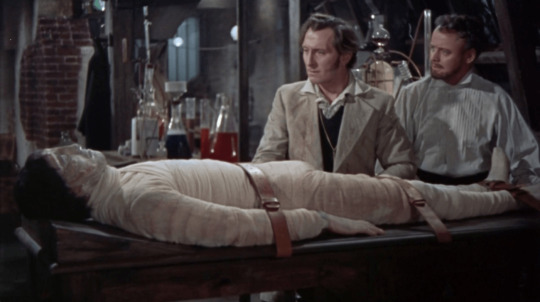
and 11 years before genre-defining zombie film Night of the Living Dead was released in black and white.

So why were black and white films able to hold on, and compete against color movies, for almost half a century, but then quickly disappeared in the 70s?
Television.
In the 1950s, just when color film was becoming popular, so too was television. Black and white television. For the average person, a color movie was something you could only see in a theatre, but because of television, people were still used to watching things in black and white. Color may have been a bonus, but it was something additional, not the standard. However, once color television started becoming the norm in the early 70s, people were watching color movies at home, when they went to the theatre a color movie was now the standard, and black and white was lacking a basic feature. People just weren't used to it anymore, and the only time they saw black and white movies was as cheap filler programming on TV, which only strengthened the idea that black and white meant substandard.
Now I'm not going to be the pretentious asshole and say that black and white movies somehow magically have more artistic value and we should go back to that. It was cheaper, that was it. People used it as long as they could because film was expensive and color film was very expensive. Now it's cheaper to film on 4k digital in full color, so that's the reasonable thing to do. I just suggest that everyone drop the early-70s mindset that black and white films are intrinsically inferior and not worth your time.
#film history#horror movies#the last man on earth#2000 maniacs#house of wax#plan 9 from outer space#night of the living dead#the curse of frankenstein#weird rant
32 notes
·
View notes
Text
Do antishippers consider themselves conservatives?
Wikipedia quotes are in orange to provide definitions to clarify my point: American conservatives tend to support Christian values, moral absolutism, traditional family values, and American exceptionalism, while opposing abortion, euthanasia, same-sex marriage, and transgender rights.
Further breakdown of points: Christian values include the concept of 'sin' as a moral failing and heavily stigmatize sex for any method other than for heterosexual procreation, and a goal of 'purity from sin' includes the absence of sinful thoughts. It includes censorship of sexual content, especially in films and on television, sexual abstinence outside marriage and abstinence-only sex education to protect children from topics that may harm them.
Traditional family values places a parent (usually the father) as the head of the household, with a submissive wife and obedient children who are seen as property. It encourages families, rather than the government, to take care of children. It is also used to advocate against an enormous list of ideologies, including feminism (which disrupts the masculine center of power) and divorce (which disrupts the traditional family model)
Moral absolutism is an ethical view that some (potentially all) actions are intrinsically right or wrong, regardless of context or consequence. It can also be referred to as black and white thinking.
To quote fan-lore: Anti-shipper is someone who is against the portrayal of certain romantic relationships. Since the mid-2010s, the term is most often used to refer to a fan who believes that it is morally wrong to ship some ships.
In contrast, the general concept of a pro-shipper is that they believe "fiction is not reality" and often see every ship as valid, regardless of the opinions others may have towards the ship. Proshippers and Antishippers most often butt heads regarding (perceived or literal) representations of incest, non-con or dub-con, underage or age gap romances.
Please note that your own individual race, sexuality, religion, etc. do not exclude you from either category. Being LGBTQ and being liberal are two different, though often overlapping, categories.
If you send me any kind of hate, you owe me $1 per message.
17 notes
·
View notes
Note
Hi hi, just wanted to send an ask giving you my regards of appreciation for your work on Jessie Gender's video about the barbie movie. I thought the script was well-written and easily understood even by someone like me who is just beginning to breach lessons I learned from society about how the world works vs the inequalities faced by intersectional people across the world and especially the western view of capitalism and its impact on how it reflects back on what society values. Also it reminded me that i need to finish watching the matrix movies with a fresh perspective and enioy its nuances. Much love for your future endeavours and I hope we can all continue to believe in a better world for all of us in our time.
I'm glad you liked it! Thank you for the kind words I'm pretty proud of my work on that script, also heres the video for those on here who have not seen it. I really wish I had liked the film, I am frankly baffled by the reception it got.
youtube
Also if you're going to rewatch the matrix films, may I suggest watching these 2 videos first.
youtube
youtube
It was a very weird experience seeing Barbie's strangely cis misappropriation of elements of the Matrix to attempt to talk about gender more directly, while ending up saying worse things about gender than the much more allegorical metaphorical aspects of the works it aped from. Made me frankly appreciate these films more than I already did.
The Matrix in similar ways to Barbie is limited within certain privileged perspectives, as I discuss early in The Matrix is Intrinsically Trans, but Barbie somehow manages to make that issue significantly more noticeable and more prominent.
And just to be clear for those who have not watched, while Jessie and I are critical of Barbie, we also touch on its good elements and at the end of that bit, to quote an addition I made to the script, state that "Discussing our issues with the work does not remove those positive elements, just like how someone enjoying the film does not remove the issues. Multiple things can be true about a work at the same time, and ignoring marginalized perspectives because its inconvenient to you is an issue both in the film and with people who want to enjoy it uncritically."
17 notes
·
View notes
Text
down then left octavius vs canon octavius
i think it's safe to assume that most people would say the version of octavius i've invented for down then left is vastly different to the octavius we see in the films, and i can see why. canon octavius is loud, brave, confident, and generally a very fun and cheerful little guy. down then left octavius is, well, none of those things. or at least a lot of people probably see it that way. the thing i love about aus, though, is the fact that it's the perfect opportunity for a writer to explore one of my favourite concepts; being a product of your environment. your physical surroundings, the people you interact with, and in this case even the time period you're in, are intrinsic to who you are, to some extent. octavius was simply meant to be in ancient rome. it's just where he belongs. it's where he fits. his role as a military leader - and one operating under an empire trademarked by active and offensive territorial expansion, at that - is what gives him the chance to truly thrive, and put to use the traits we don't always see in down then left octavius. natural leadership, confidence, and bravery. when you remove someone like that from his intended time period and stick him in a world dominated by computers, late stage capitalism, and repetitive mundane responsibilities, it's no wonder we no longer see him as the same person. in a way, down then left octavius' job as the manager of a big company does showcase his abilities as a natural leader. we don't really get to see this in action but there are definitely hints of it, and we can obviously assume that it's there since he's been able to work his way up to the position he's in now. but how can we expect down then left octavius to be confident, for example, when he's living in a world that has no use for his positive traits? he's supposed to be doing something far bigger, far more long-term and with a far clearer cause than a mediocre office job. if down then left octavius had a chance to do something he actually enjoyed - and was actually good at, most importantly - he'd arguably be just as confident as canon octavius. there are signs of this token confidence throughout the fic, if you look for them; octavius' ability to stand up for himself or other people without a second thought, his tendency to naturally assume he's correct in his thoughts and opinions, his brashness and bluntness with complete strangers like the angry man in the bar. it's there, it's just not happening in the right environment for it to really flourish in a way that's particularly noticeable. we don't have canon octavius' backstory, so for all we know it could be very different or equally very similar to that of down then left octavius, who grew up not only closeted and emotionally neglected, but also with no real outlet in which he could really channel any of his passion or natural abilities and positive characteristics. the main difference here is that when you add all this into an environment with very little space for self-expression or discovery, almost no healthy human connections, and a world that no longer values the qualities needed to be an ancient roman imperator, you end up with a repressed, awkward, mentally-ill loser who seems so fundamentally out of place wherever he steps foot that it's hard to believe he was meant for this timeline at all. the museum gives canon octavius not only somewhere he can still dress, behave and live like he may have done in ancient rome, but also a place where he can be himself and be understood and cared for; something down then left octavius has never had. if i've done my job as a writer correctly then hopefully the more we get to knpw down then left octavius, the more we start to realise that he still has all of canon octavius' qualities in him somewhere, even if we have to dig deep to find them. he is capable of laughing and having fun; he is capable of being sweet and kind and forming meaningful relationships; he is confident, and loud, and silly. it's the world around him that's changed here, not octavius himself
#does that make sense grabs you by the shoulders DOES THAT MAKE SENSE ???#i'm so bad at explaining things but#i just. don't understand when people assume someone's out of character when they're in a vastly different universe#like. we are where we are. if you take all of our world away from us what's left#wwhatever i'm normal about aus and the human condition#down then left
21 notes
·
View notes
Text
perhaps it is just because the film speaks perfectly to many of my interests, but i deeply enjoyed infinity pool (2021). like brandon cronenberg’s previous film antiviral (2012) and departing from his father david’s works, this film deals not so much with the transformation of a person as their reduction to something functionally inanimate, in this case through the mechanism of kitch. set in a fictional third-world country heavily reliant on american tourists for income, this film first shows the country’s own culture, then other better-known but still “foreign” (to americans) cultures, then finally the body and soul of the protagonist itself reduced to something that can be guiltlessly bought and sold through kitch. cultural artifacts replicated endlessly—ceremonial masks sold in the gift shops, faux queues and polyester cheongsam worn by non-chinese waiters at a chinese restaurant, clumsily performed “bollywood dance”—develop into things no longer capable of possessing specific or intrinsic significance, but rather mere indications of the idea of foreignness that can be purchased and worn for no purpose other than to signify contact with the out-of-the-ordinary, a conveniently purchased expansion of horizons. in such a way does the institution of cloning weaken, instance by instance and iteration by iteration, the sign-signified relationship between a living body and a life of equal value with one’s own, until brutality is just a fun game that those who afford to can play. the film’s gorgeous cinematography works in harmony with this theme, cutting sharply before scenes and presenting the audience with frequent extreme close-ups for a defamiliarizing effect. this effect discourages the audience from taking the objects they see, be they a costume or an act of violence, as mere shorthands for something else without significance in and of itself. combined with the truly gorgeous lighting and the effectively presented ideas, infinity pool (2021) was a highly effective movie that i enjoyed very deeply
11 notes
·
View notes
Text
The obvious issue with the whole "compassion, which I would define as unconditional love, is essential to a Jedi's life" line being the one time that this gets so clearly stated in the films, is that it's coming out the mouth of Anakin Skywalker in a moment that feels pretty blatantly manipulative.
Like Anakin's FACE in this moment is all about trying to convince Padme to bone him, it's all about trying to convince Padme he's not just "a little boy from Tatooine" anymore, but a Man that she should have interest in. He's not just genuinely telling her about Jedi philosophies because he believes in them, he's giving her a LOOPHOLE.
So while "possession and attachment are forbidden" feels like genuine recitation of Jedi philosophies, the compassion line just ends up feeling like either Anakin straight-up lying to Padme or bending the truth a bit because he just so desperately wants to fuck her.
Which leads to audiences not reading the line as a legitimate thing the Jedi believe and taking it seriously as a lens through which to view their actions. I know I didn't, I DEFINITELY read the line as kind-of manipulative and not entirely truthful. Anakin's got a pretty clear agenda with saying it, which just automatically makes it an untrustworthy thing to say. It doesn't help that Anakin is pretty consistently shown to go AGAINST Jedi philosophies and values when he has a specific agenda in mind, that he doesn't truly live his life by them. So why would we trust a single word out of his mouth about what the Jedi believe or what's central to their life?
Even though we have constant examples of the Jedi loving people and being compassionate and kind to people, this line is the ONE TIME that we get this laid out so explicitly and it's done in such a way that makes it intrinsically unbelievable to an audience, so all of those moments of the Jedi following that philosophy just get ignored or brushed off as aberrations.
I wish the line had come from almost literally anybody else. Yoda, Obi-Wan, Mace, or any one of the numerous Jedi who showed up in TCW. Literally ANY OTHER JEDI saying this would have had a very different impact because it would pretty automatically feel more genuine and more of a true insight into the Jedi's beliefs and values.
75 notes
·
View notes
Text
@freebird_games: It’s been over 10 years since To the Moon’s release, and every once a while I still get questions on why To the Moon never spells out the word “autism” or “Asperger’s” despite it playing a key role in the plot and character.
I wanted to explain why here.
At the time the game was released (2011), the presence and portrayal of autism in media was becoming more prominent, with numerous films and other media bringing its characterization to the forefront. However, the word “autism” became very cookie cutter, and essentially an archetype, such that when someone not familiar with it at the time (most people) hear the word, it immediately colours their image of the character predominantly as the stereotype.
To no fault of their own, to be fair. It was just how media at the time had trained us, combined with the human phenomenon where our mind tends to lose focus on nuances of an unfamiliar group (the root cause of the “y’all look alike” thing).
Autism spectrum is an important part of the story. But River as a person beyond her condition was also an important part of the story. So, in an attempt to shed light on it while keeping the stereotype from affecting the perception of her, I decided to pull instead of push.
I left clues all over the game — from traits to the author for relevant research on the subject (Asperger’s was a sub-classification at the time). The mystery of the character was who she was — both her intrinsic motivations as a person, and her specific condition.
I’ve always found that it’s easier for us to truly learn and understand when we’re pulled to look further into a subject ourself, than to have something pushed onto us.
But to be clear, I think there is value in simply getting words like “autism” out there as well, and that people should do it to bring awareness. It just accomplishes a very different thing.
Like many things in biology and sociology, different roles are needed. One brings upfront awareness but may trigger barriers, and the other brings less immediate awareness but may make people more susceptive to it in depth.
Different jobs, different sections -- both of the same funnel for the sake of more understanding between people.
While making To the Moon, I got involved in online communities of people on the spectrum. I got to know several people there, and one thing I felt that I didn’t feel that clearly from media was how different people on the spectrum can be. They all shared traits that may be a bit removed from people who were neurotypical, but they were also their own unique persons with deeply varied personalities, quirks, troubles, and aspirations.
And I can’t help but feel that’s something that we always tend to take for granted, especially in times of conflict in narrative between our inner and outer groups of people — whether it be psychological, ideological, or political.
The “Y’all look alike” phenomenon is a very human and natural thing, and it happens beyond just physical appearance. I don’t think people should be blamed for experiencing it, but I do think the world would be better if we were to more actively catch ourselves when we do.
In the end, it’s interesting how fighting against the natural human tendencies is actually how we become more human. I guess that’s how we evolve.
... Anyway, I’m rambling now so I’ll end it here. Hope that explains it and thanks for coming to my ted talk~
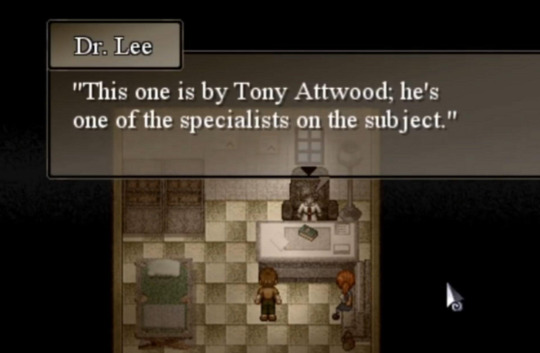
5 notes
·
View notes
Text
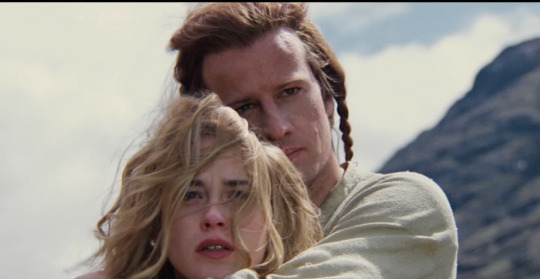

Heather MacLeod & Brenda Wyatt.
MacLeod´s two only wives in 467 years, they are two fascinating characters. (The sequels and series are from a kind of AU, never existed)
Because they represent women in two different periods, what is changing, their rights and opportunities, but they also represent what does not change, the concept of love.
And looking at these two magnificent women, the great forgotten secondary characters of this film (one of the best of all time), and analyzing the aesthetics of her scenes with Connor, you can appreciate the social status of the woman with respect to the man.
But let's go further. Heather is the devoted wife (as God intended) in 16th century Scotland, she is the damsel in distress, and the burden of her well-being falls on the husband she loves so much.
She leans on him.
From her image it is clear how Heather in exchange for taking care of the farm chores, for always having everything in order for her man, she is everything to him, but he is more to her, he is her economic, emotional, universal support. Without him she couldn't survive. Only if she got another husband.
That's why Heather is so pure, so beautiful, the ideal woman, the one any man would want, Connor loves her and desires her intensely. Physically Connor holds Heather's burden lovingly, in the first photo. He is the active part and the pillar.
And we have my favorite, the glorious Brenda. The only police officer with the brains to unravel who Connor MacLeod really is, and in fact the only one among all the idiots that Captain Morán commands who succeeds (I certainly get the feeling that Brenda had something with old Morán romantically, even if it is platonic , but it didn't work, before she met MacLeod).
Brenda represents the woman of the 20th century, almost 21st, with a successful career, published books and an intrinsic value in being a researcher, a thirst for ambition for her development of professional progress, thus pursuing the trail of Connor's katana. Basically she falls in love with the professional opportunity that Connor would give her by teaching her his katana, upon making a discovery. Yes, Brenda is selfish & interested while he stares her with dreamer eyes, i´m sorry.

That is why in their aesthetic together, at the end, when MacLeod is finally mortal and receives his prize, he has telepathy, he feels that he can finally rest from caring for others after 467 years, that is why he is the one who takes the passive part that before occupied by Heather, it is Brenda who will support him emotionally now. She's the strong one, MacLeod has been strong for too long already.
MacLeod has loved Heather dearly. With her he knew the true love & the passion.
With Brenda he has discovered the game of cat and mouse, he has been dazzled by her tough game, with her beauty even more emphatic than Heather's, she seems to almost not reciprocate his love in more than one of their scenes in the film, until she does.
MacLoud psychologically suffers more with Brenda on a day-to-day basis. Because it seems like unrequited love at first.
Sexual desire and the need to feel loved are brutal with Brenda. Rachel always knew it.
The shock after their encounter is so great that both are physically and mentally attached to each other.
In this case, the pillar is and always will be Brenda. She will emotionally protect MacLeod. She will give him whatever he needs even if it is money (which will never happen since he has much more, valuable possessions, she pays for it).
That's why MacLeod rests on his own pillar (Brenda) like in the photo, on someone who will take care of him, after a long time. Here Brenda is the one who takes the masculine role and MacLoud the feminine role, many would say, but in reality it is nothing more than a change in heart and circumstances, it is a total healing of a love wound that lasts almost 500 years.
#highlander#connor macleod#brenda wyatt#christopher lambert#roxanne hart#connor x brenda#connor x heather#about roles#about emotional pillars#female role#masculine role#empowered woman#beatie edney#immortal love#analyzing the immortal lovers
2 notes
·
View notes
Note
Luke and Mara?
This is an easy one, I'm afraid! I do not ship them even a little bit.
1- Why don't you ship it?
For one, I didn't read most of the material they were even in. I'm into the films, and ships that involve characters that aren't even in the films are intrinsically not interesting to me (and I've never bought into the idea of "no actually there are all these other Force-users floating around as Imperial policy", then or now).
For another, I headcanon Luke as asexual, and usually as aro/ace + happily celibate and "alone" for a Skywalker value of alone. I see his bonds to Leia, Han, and Anakin (two of which are literal psychic bonds) as the most important in his life. There are some Luke ships I like in fanfic, but as far as canon goes, I don't like the idea of him in a romantic relationship with anyone and after ROTJ especially, I can't really see it.
On top of that, certain parts of the fandom pushed the pairing really hard in my first few years in SW fandom. I did not appreciate being corrected, pressured, and sent outright hate over not being into Expanded Universe-only stuff and over headcanoning Luke as aro/ace. I've never gotten more unbridled hatred in my asks over anything and I try not to let that shape what I think, but it certainly did not soften my feelings.
2- What would have made you like it?
It would really need to have been woven into the films in a satisfying way that didn't sideline Luke's other critical relationships. Mara would probably have needed to be there from ANH or at least early in ESB—not necessarily "there" in scenes with Luke, but established with a role of her own in the story so it didn't feel tacked on or obligatory. And Luke's vibes in ROTJ would also have to be pretty different.
A pretty steep task, obviously. But I've always really loved that the resolution of Luke's arc in the OT doesn't involve "getting the girl", or getting anyone in that sense. For him, the happiest possible ending is all about his relationships with his father and his sister and his friends, and it's honestly still refreshing for me to see that. So it'd have to be incredibly good in the films for me to actually ship it, even if some specific things could lessen my dislike.
3- Despite not shipping it, do you have anything positive to say about it?
From what I can tell, Mara is a pretty cool character in her own right, and her books do seem to be among the better ones. The general outline of the dynamics between Mara and Luke as far as I've osmosed them seem like they could make for a really compelling kind of enemies -> battle couple pairing if I were into that for Luke.
#brambleberrycottage#respuestas#sweu critical#sw fanwank#luke x mara critical#meme prattle#long post#anghraine's headcanon
21 notes
·
View notes
Note
iirc Jensen originally wanted to audition for Sam or he did I can’t remember that part. HAD HE GOT SAM… would you still be an anti 😈
Hmmm... That's a good question, and the answer is a touch difficult...
On the one hand, a lot of my issues stem --- as far as I can isolate --- from Sam's character as it was written. I remember not much caring for his values from episode 1, and that's writing, not acting. Additionally, judging by my experiences with both John and Mary, I can very much love a performer --- I love JDM in every role in which I've ever seen him (SPN, of course, but also Walking Dead and various films), and Samantha Smith is great too, though I haven't seen her outside of SPN --- and hate the character.
On the other, however, Jared has never been a great actor in my eyes, and has just... largely gotten worse. So there might well be a degree to which Sam's character and his acting were intrinsically connected from the beginning. Additionally, someone mentioned --- I think it was during the anti-Jared war about a month ago? Sorry if that timing is wrong --- a good point: that Jared's worsened performance led to fewer Sam-centric arcs, different handling of his storyline, etc. Thus, if there were a different actor in his stead, maybe Sam's character wouldn't be something I'm as anti towards as it is now.
So, I think the answer would be yes, I would still be an anti. There's a possibility that both would get closer to a midpoint (e.g. I'd watch and Jared's acting would bring down Dean's character while Jensen's would elevate Sam's), but I don't know that for sure.
Hope that answered the question, and thanks for the ask!
#answered asks#scripted downfall asks answered#anti jared padalecki#anti sam#anti sam winchester#yes it's both#jared stans... you should know what to do by now. DNI!!!!#i always come when you call (sd)
32 notes
·
View notes
Note
So Lily released her video about The Mummy movies. And surprise, surprise, she mentioned nothing about the racism in all of the movies. Instead she claims the films are "fun" and basically implies if you don't like it you have a stick up your ass.
Also she complains about movies being dark and gritty, calls vampires and werewolves aristocrats and predators again, and manages to snipe a comment at Christie Golden because she's still pissy about Sylvanas.
But the issues of racism in these movies? Crickets. Even the retelling of The Mummy she presents isn't a deconstruction of the inherent imperialist themes of the film. It's just more boring toothless sapphic fluff. It's all about how hard it was to be two loving lesbians in a cruel homophobic time in ancient Egypt holy shit what the fuck.
(note for everyone: don't watch the video directly. if you want to view the video to critique on your own or know if there's anything more worth commenting, do it through this link that won't give LO any views: https://cinemaphile.com/watch?v=Vf_hUx5y0m8)
on top of that, it's also gross that LO would shove a homophobic narrative on a society that, as far records show, was actually a lot more progressive that modern times were. we have records of not only transgender people living during this time period where a strict binary didn't even exist, but gay couples existing freely, living normal lives and even being buried together. if you as much just put "homosexuality in ancient egypt", this is the first result i came out with:
https://hyperallergic.com/742038/could-this-be-the-first-recorded-gay-couple-in-history/
“Niankhumn and Khnumhotep were two male lovers who were buried together in a joint tomb in Saqqara, Egypt,” Manson told Hyperallergic. “Their epigraph reads ‘Joined in life, joined in death.’ I created this piece to capture the love and intimacy the two shared, and show that Black, queer love is as old as time itself.”
Discovered by Egyptologists in 1964, murals on the tomb depict the two men in a pose traditionally reserved for husband and wife. One panel features an embrace with noses touching — a pose of marital intimacy within the lexicon of Egyptian art. Homosexuality was not uncommon in Ancient Egypt, and clearly their relationship was both approved of by the pharaoh and close enough to call for co-burial — though the exact nature of their partnership is debated by historians, who make various cases based on the imagery in the tomb.

but these are men. LO doesn't care about queer men, black or otherwise. luckily for us and anyone who does want to make a better sapphic story with an ancient egypt setting, there's also signs that sapphic women existed back then and could be treated exactly the same as any couple.
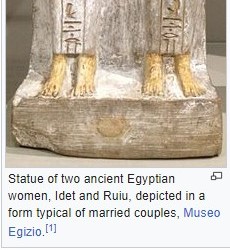
this is a thing that many people might be surprised by but homophobia is not the natural state of the world. many ancient societies did not care about such concept, just like they didn't had any interest on a strict binary or keep "traditional roles" as tighly as some people care even today. you'd hope any advocate for LGBT+ rights already knew at least a little bit of it because often LGBT+ people are forced to prove that they always existed, they were always there, and these kind of records are important to prove just that. it helps us to see that all of that (transphobia, the gender binary, homophobia, etc) were all man made and they can be desconstructed, disregarded entirely even and hold no intrinsic value.
instead...
LO invented homophobic ancient egyptians completely on her own and i find that so weird, because this was one of those rare ocassions in which she could freely play with the idea of a sapphic story where homophobia had no role at all and she just put homophobia anyway.
i know, this is a fantasy story... but it's supposed to be based on a real time period. the least you could do then is do the most bare of minimun research to know what you're talking about.
you clearly didn't care to bring out the overwhelming racism of the original movies (even though that was a common point of critique... in the 90s), so at least could have bothered to paint egypt on a general better light but LO couldn't be bothered to do not even that because it got on the way of her sapphic bland story.
besides all of this... her pitch is just boring? there's no action, there's no big stakes, there's... nothing of what she claims she liked about the first movie. there's not even an actual antagonist, it's just a boring attempt at comedy of misunderstandings. there's an idea there but actual story wise, nothing.
18 notes
·
View notes
Text
Twilight Is So Straight, It’s Gay: An Exploration of Camp and the Unintended Queerness of Twilight
Camp aesthetic is a visual movement that communicates appeal through what would be considered tacky iconography, prescribing value (whether good or bad) through the irony of ugliness or gaudiness. It is theatrical, over-the-top, and dramatic. Campiness has long been tied inextricably to queer culture. Queer films little known to heteronormative society such as Debs, and, But I’m a Cheerleader, or even ubiquitous cult classics to the tune of The Rocky Horror Picture Show, and, Hedwig and the Angry Inch are undeniably campy. Within these works, the performance of heterosexuality is unsettling and seems unnatural due to the theatricality of the relationships (one only has to see But I’m a Cheerleader’s Natasha Lyonne drowning in the mouth of her character’s football playing boyfriend during a make-out session to see what I mean here). This type of camp is intentional and pointed. However, the performance of heteronormativity can easily fall into the realm of camp without intending to.
Stephanie Meyer’s Twilight Saga is never intentionally Queer; in fact, there’s not even a whiff of overt gayness to be found in the behemoth four book teen melodrama. Edward Cullen and the rest of his vampire family, as well as the rest of the town of Forks seem to be one hundred percent heterosexual. But since its release in 2008, and especially since the 2020 Twilight “renaissance”, Twilight has accumulated a steadfast and growing queer following, leading to packed midnight showings of the films, memes, fan art, and more. Twilight’s over-performance of heterosexuality whilst simultaneously destabilizing aesthetic gender constructs places the series firmly, if unintentionally, within the campy queer classics canon.

Judith Butler’s Gender Trouble states,
“heterosexuality offers normative sexual positions that are intrinsically impossible to embody… both a compulsory system and an intrinsic comedy, a constant parody of itself…” (155).
Heterosexuality that does not have reproduction as a teleological goal is by nature not heterosexual, if society were to agree with the purpose of sexual desire as defined by anti-gay movements. In Twilight, the vampires are considered to be extremely sexually attractive, but in their current form, they cannot reproduce sexually. The relationships between vampires Alice and Jasper, Rosalie and Emmett, and, Carlisle and Esme, are now queer, because they are
“contesting the categories of sex or, at least, not in compliance with the normative presuppositions and purposes of that set of categories” (156).
However, that’s not to say that sexual anatomy and reproduction defines gender or sexuality. For Butler, the performance of gender in queer relationships has to do with the destabilization of perceived gender constructs as they come into “erotic interplay” (157). A femme lesbian being sexually attracted to only cis-gendered women, but also being aroused by a butch lesbian’s performance of masculinity, is an example of that erotic interplay. This becomes even more expansive in contemporary queer discourse, as we start to understand the performance of gender beyond the binary of men and women. Edward and Bella embody this destabilization through each of their gender crossing attributes. When Bella first witnesses Edward’s vampiric skin when it interacts with sunlight, she narrates,
“his skin, white despite the faint flush from yesterday’s hunting trip, literally sparkled, like thousands of tiny diamonds were embedded in the surface…his shirt open over his incandescent chest, his scintillating arms bare.” (Meyer 260).
Bella later goes on to say, “I would have liked to lie back, as he did, and let the sun warm my face. But I stayed curled up, my chin resting on my knees unwilling to take my eyes off of him” (260).
Edward becomes the object of sexual desire for Bella, subverting the narrative convention of the female being the focus of male desire.

Masculine presenting people wearing glitter and being desired sexually is an intersection of the erotic interplay of gender performances. Edward is meant to be at his most beautiful when he’s in the sun. Meyer’s reasoning for his beauty is that it makes him, according to Edward himself, a perfect predator. He says,
“Everything about me invites you in – my voice, my face, even my smell” (263).
Meyer’s vampires use the erotic interplay of masculinity embodying elements of feminine presentation as an example of the ideal form of sexual desire, and therefore are able to seduce their prey before killing them. It is reminiscent, in some ways, of the seduction of Janet and Brad by Dr. Frank N. Furter, whose own drag aesthetic is considered to be erotic to all of the characters in The Rocky Horror Picture Show at one point or another.
Edward and Bella are also transgressive due to the differences in their species. Edward states many times throughout their will-they or won’t-they courtship that their being together is a bad idea. In fact, he likens it to a predator falling in love with its prey; in the same scene where Bella sees his sparkly skin for the first time. He says,
“And so the lion fell in love with the lamb” (273),
noting the innate perverseness of their love. Vampire stories have been linked to queerness for nearly two centuries. Dracula leads the way with the homoerotic subtext between The Count and Jonathan Harker in Bram Stokers 1897 novel, something that is essentially canonized in the BBC adaptation from 2020. In the series, Sister Agatha Van Helsing asks Harker if he had “sexual intercourse with Count Dracula” and he remembers back to a dream he had at the castle where his sexual fantasies of Mina shift into a sexual fantasy of Dracula. The series ends with Van Helsing and Dracula together in their own sexual fantasy, which shows the way transgressive sexuality is eroticized in the vampire plot. Van Helsing hates Dracula for his cruelty, but is still attracted to him. Edward lacks Dracula’s cruelty, but his monstrous status has in actuality turned him into an ideal beauty. Bella is attracted to him in part because of his inhumanity, describing his face as angelic or godlike (Meyer 262). Her attraction to Edward is transgressive in a similar way Agatha Van Helsing’s obsession with Dracula is transgressive.
In a pivotal scene in both the book and the later 2008 adaptation starring Kristen Stewart and Robert Pattinson, the vampire family plays a game of baseball together. The Cullen family can only play baseball during a thunderstorm, due to their super vampire strength (apparently they can hit a baseball hard enough to be mistaken for a crack of thunder, but yet the ball remains completely intact). Baseball seems to be a fairly all American, wholesome, straightforward activity. However, the way the Cullen family plays is decidedly theatrical. Everything they do is over the top and extra, from their vehicles;
“They circled around Rosalie’s red convertible, unmistakable lust in their eyes” (Meyer 222),
to Edward’s piano playing, to baseball. Everything is designed to make them stand out, and apart from the rest of the town. They are the monstrous other, even if they never actually drink human blood. Their everyday activities are performance.
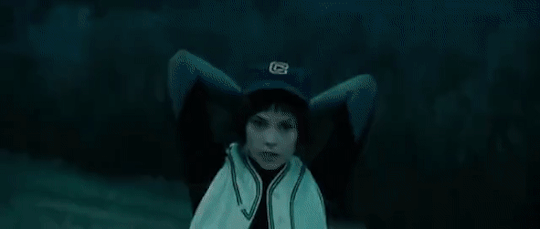
The Cullen family is theatrical in all things, but especially in romantic partnerships. The first night Bella and Edward ever spend together, she tells him that she loves him. He responds with,
“‘You are my life now’” (314),
which is an intense confession to make after one kiss and a sleepover. Throughout the rest of the novels, Edward and Bella remain obsessed with each other to the point of suicide. In the second installment, New Moon Edward believes Bella has died, and tries to kill himself. He says to Bella,
“I wasn’t going to live without you,” (Meyer 263).
In the last installment, Breaking Dawn, when Bella almost dies (again), he forms a suicide pact with Jacob where he wishes for Jacob to kill him if Bella doesn’t survive. He tells Jacob,
“the moment Bella’s heart stops beating, I’ll be begging you to kill me” (Meyer 70).
The theatricality of their relationship, along with the transgressive nature of the vampire plot, turns displays of heterosexuality into unintentional camp. This, paired with the erotic interplay of gender performances, shows us that Twilight is so straight, it’s gay.
33 notes
·
View notes